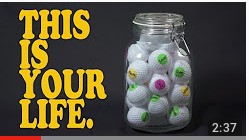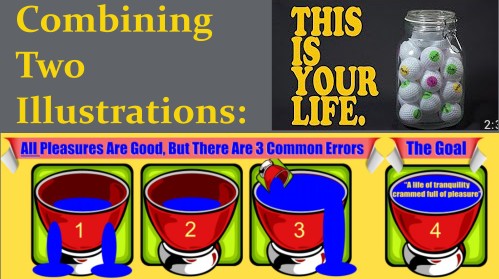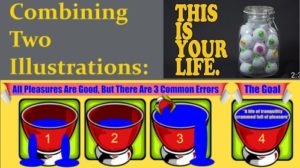A Combination of Illustrations: Seize the Day In 2018 To Fill The Jar Of Life
I am not an artist and I have not yet been able to produce my own animation of this, but I have become aware that on Youtube and elsewhere there are many modern parables about how to “fill the jar of life.” With only slight modification – or really no modification, other than additional explanation – Epicureans should consider the same analogy as a great illustration of the Epicurean goal of life. With just a little extra background framework, the modern “jar of life” analogy provides an easy-to-grasp animation of the process we should all strive to follow.
I have illustrated the analogy previously here in the “Full Cup / Fullness of Pleasure” graphic. The linked page summarizes the point as made in the Epicurean texts with numerous cites, leading up to the following illustration:
The additional overlay provided by the “Jar of Life” videos on youtube is helpful in several ways (click on the picture to view the video):

(1) Just as the video emphasizes, if we want to make sure we get the “big things” in life done before we die, we need to emphasize them and put them in the jar first. That is because if we spend all our time on the little things, those little things fill up the jar first, and prevent us from fitting in the larger ones. If we truly wish to be sure we get the big things in, we must fit them in first, and then pour in the smaller things to fill in the gaps. This is the main point that people today use the video to illustrate.
(2) But Epicureans can go much further. Our key is to observe that ALL the things placed in the jar, large and small, can be seen to represent Pleasures, with the empty space driven out representing Pain. As the modern Jar of Life videos often show, the things placed in the jar can be labeled and thought of as the particular desires we wish to pursue in life: love, relationships, intellectual stimulation, healthful body, education, art, contentment, etc. As we place these desires/pleasures in the jar, the jar is filled up and air/empty space/pain is driven out. Depending on the type of pleasures we pursue and add to the jar, gaps/empty space/pain will remain in the jar. As Epicureans we know that we have but one life to live, so we know that we should work to fill each moment of life with all the pleasure that is possible. So Epicureans don’t stop with the large things, but add into the jar smaller items, even down to pebbles, sand, and water, which will fill the empty space and make sure we get the most out of life with the least pain.
At each step along the way as we drive out empty space / pain by our successive addition of pleasures, we can see why Epicurus referred to “absence of pain.” As we pursue our goal of life we are filling the jar with pleasure, driving out pain, with the natural result that pain is increasingly absent – we are approaching a state of full pleasure without pain: aponia. The most efficient and desirable description of our final goal is to drive pain out of the jar completely, while neither shattering the jar nor spilling pleasures unnecessarily by disturbing its foundation of its structure – we are filling the jar without disturbance: ataraxia.
But there are other very important points:
(3) In a natural universe where there is no supernatural or Platonic realm of absolute arbitration of truth, worthiness, or “virtue,” there is also no absolute list of which pleasures which every person is required to pursue. We all have our own ideas of which pleasures WE think to be “best,” but that is an individual choice which will differ by background, culture, education, training, biology, genetics, and many other factors. While there are certainly observable parameters and limits which Nature imposes (for example, we all must eat, drink, and attend to the ordinary necessities of life) there is huge variation on how we achieve those, and what other pleasures we can pursue. Thus Epicurus did not attempt to describe the impossible and the non-existent: there is no formula by which everyone can list out a series of “worthy” objectives that everyone should pursue. While it is possible to observe that some pleasures are “natural” and some are “necessary,” and that the choice to pursue simpler pleasures is generally more sustainable and less likely to lead to untenable pain, Epicurus always emphasized that the choice of what to pursue and avoid is ultimately practical (meaning it is going to vary based on circumstance) and that the only ultimate question to ask is “What will happen to me if I make this choice? Will it lead to pleasure or pain?” In a universe where neither gods nor fates determine outcomes ahead of time, it is up to us to prudently judge our circumstances and to choose based on our understanding of our proper goal: filling our own jars/lives with pleasurable living.
The jar of life analogy thus helps us illustrate some very important points. I hope in 2018 that we can produce a directly Epicurean animation or video to focus on these points. But at the same time, we shouldn’t forget that the entire question of “filling the jar” and “absence of pain” does not exist in a contextless vacuum. If we forget the reason why we are discussing this, we end up keeping mainly the less-important observations such as “put the big things in first.”
Not everyone agrees with Epicureans that our lives are like jars to be filled. Many people think that gods gives them a numberless successions of jars, and that those jars should be filled as their gods or or their Platonic guides tell them to fill it. That’s where Epicurean Physics and Epicurean Canonics comes in, to allow each of us to grasp the proofs that these contentions are false.
Therefore most of all, as we observe from the constant discussion of “limits” in the Epicurean texts, we need to remember that there are dialectical tricksters waiting at every corner to seduce and confuse those who wish to take life and philosophy seriously. Such people (Judeo/Christian/Islamic priests today; Plato/Philebus in Epicurus’ day) argue that Pleasure should not be viewed as the goal of life because Pleasure can never be satisfied – they argue that it is possible to always want MORE pleasure, and that pleasure is better if something else is added to it (knowledge or wisdom, for example).
The primary purpose then of the jar of life analogy in Epicurean terms is not therefore to illustrate that “the big ones go in first.” The primary purpose in deeper terms is to illustrate that Pleasure IS properly thought of as the goal of life, because it DOES have a “limit” and there is NO reason to think that anything else (other than pleasure itself) need be added to the jar to make pleasure “better.” The “limit” of what we can achieve in life is to fill our experience with pleasures, just as we fill the jar with objects large and small in the analogy. This understanding frees us of Gods, of Platonic Guides, and of Dialectical Tricksters, and gives us an understandable framework within which we, as Epicureans, SEIZE THE DAY, according to Epicurus himself:
PD20: The flesh receives as unlimited the limits of pleasure; and to provide it requires unlimited time. But the mind, intellectually grasping what the end and limit of the flesh is, and banishing the terrors of the future, procures a complete and perfect life, and we have no longer any need of unlimited time. Nevertheless the mind does not shun pleasure, and even when circumstances make death imminent, the mind does not lack enjoyment of the best life.



